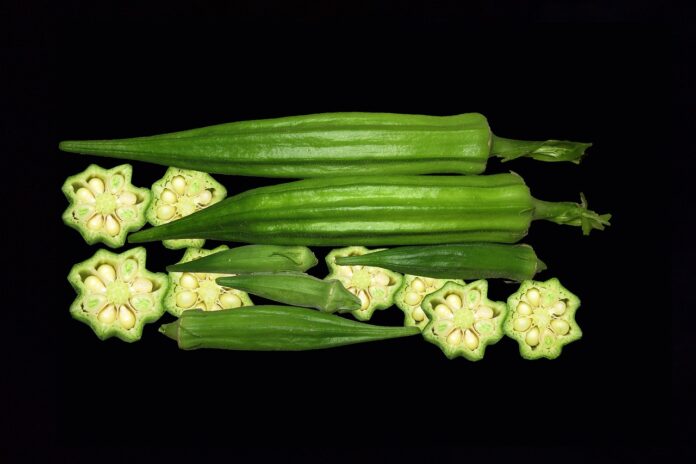Okra (Abelmoschus esculentus), also known as ladies’ fingers or gumbo, is a flowering plant in the mallow family (Malvaceae). It is primarily grown for its green, pod-like fruit, which is a staple in many cuisines around the world. Believed to have originated in the region stretching from Ethiopia to West Africa, okra has been cultivated for centuries and spread globally through trade routes.
Interesting Facts About Gumbo (Okra):
- Culinary Uses: Okra is used globally in many dishes. In the U.S., it’s essential in gumbo, while in India, it’s often sautéed with spices and in the Middle East, it’s used in stews like “Bamya.” In Nigeria, okra is a key ingredient in “Okra Soup”
- Slimy Texture: The sliminess, or mucilage, produced when okra is cooked, is a natural thickener. This mucilage has a significant role in dishes like gumbo, where it helps thicken broths. In some parts of the world, the mucilage is even used in traditional medicine
- Historical Coffee Substitute: During the American Civil War, there was a shortage of coffee, and people turned to roasted okra seeds as a coffee substitute. This use continued in some regions during coffee shortages
- Belongs to the Mallow Family: Okra belongs to the same family as hibiscus, a plant known for its vibrant flowers, and cotton, which is crucial in textile production. This family association highlights okra’s unique botanical features
- Rich in Nutrients: Okra is an excellent source of vitamin C (supporting immune function), vitamin K (important for bone health), folate (important for cell function), and fiber (which aids digestion). It’s low in calories but high in beneficial nutrients
- Supports Digestion: Okra is rich in dietary fiber, which helps in regulating bowel movements and promoting digestive health. The mucilage also aids in soothing the digestive tract
- Hydrating Vegetable: Due to its high water content (around 90%), okra is a hydrating food. It’s particularly beneficial in hot climates, where it helps to maintain hydration and overall health
- Heart Health: Okra’s antioxidants, particularly flavonoids and polyphenols, help lower oxidative stress and protect the heart. Its high fiber content also aids in reducing bad cholesterol levels
- Good for Blood Sugar: Okra’s soluble fiber and other compounds may help stabilize blood sugar levels. It has been used traditionally in managing diabetes by regulating blood glucose levels
- Anti-inflammatory Properties: The antioxidants in okra, including quercetin, have anti-inflammatory effects. Regular consumption can help reduce inflammation and may support overall health
- Bone Health: Okra contains calcium and vitamin K, both essential for bone health. Vitamin K plays a vital role in calcium metabolism, and calcium supports bone density
- Pollinator-Friendly: Okra flowers, which are large and beautiful, attract pollinators like bees, contributing to the overall health of ecosystems
- Fast Growing: Okra is a fast-growing plant, often ready for harvest just 50-60 days after planting. This makes it a favorite among gardeners, particularly those in tropical climates
- Global Popularity: Okra is grown and consumed worldwide, particularly in regions with warm climates like Africa, India, and the southern U.S. It is a staple in many cuisines, from stews and soups to fried dishes
- Cultural Symbolism: In some cultures, especially in the southern U.S., okra symbolizes prosperity and health. It’s often associated with good luck and is featured in cultural events
- Drought-Resistant: Okra is a hardy crop that thrives in hot, dry conditions. This makes it a valuable crop in areas that experience drought or have limited access to water
- Pickling: Pickled okra is a popular food item, particularly in the southern U.S. It’s commonly enjoyed as a snack or added to salads and appetizers
- Low-Calorie Food: With only around 30 calories per 100 grams, okra is an excellent option for anyone looking to maintain or lose weight while still getting a nutritional boost
- Antioxidant Powerhouse: Okra contains powerful antioxidants like flavonoids, polyphenols, and vitamins, which protect cells from oxidative damage, potentially reducing the risk of chronic diseases
- Self-Pollinating: Okra plants can self-pollinate, which means they do not require another plant to cross-pollinate. This trait makes them easier to grow in isolated gardens
- High in Folate: Okra is an excellent source of folate, a B-vitamin essential for cell growth and function. It’s particularly beneficial for pregnant women, as folate supports fetal development
- Varied Cooking Methods: Okra can be fried, grilled, roasted, boiled, or even eaten raw. It’s incredibly versatile, lending itself to a wide variety of cooking techniques
- Sticky but Useful: The mucilage produced by okra, while often perceived as a downside, has practical uses beyond the kitchen. It has been explored for use in industrial applications and medicinal products
- Coffee Alternative: Roasted okra seeds have a rich, nutty flavor and can be used as a caffeine-free coffee substitute, as was done during periods of coffee scarcity
- Crop Resilience: Okra can grow in a range of soil conditions and is considered an easy-to-grow vegetable, particularly in areas with poor soil
- Medicinal Uses: Traditionally, okra has been used in folk medicine to treat conditions like ulcers, constipation, and high blood sugar. It’s believed to have properties that can help with inflammation, infection, and digestive health
- Culinary Partnerships: Okra pairs well with ingredients like tomatoes, onions, garlic, and various spices. Its ability to absorb flavors makes it an ideal addition to stews, curries, and even stir-fries
- Edible Leaves: While the pods are the most commonly consumed part of the plant, okra’s leaves are also edible and can be used in salads or cooked as greens
- Historical Roots: Okra has been cultivated for thousands of years. It’s believed to have originated in West Africa before spreading to the Middle East, India, and the Americas through trade
- Supports Immune System: The high vitamin C content in okra plays a significant role in boosting the immune system and helping the body fight infections
